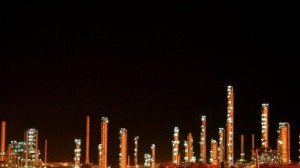 Iran is on course to become the world�s largest importer of natural gas by 2025 unless it can rein in rampant domestic demand, the head of research at the country�s energy ministry told a conference in Tehran.
Iran is on course to become the world�s largest importer of natural gas by 2025 unless it can rein in rampant domestic demand, the head of research at the country�s energy ministry told a conference in Tehran.Iran sits on the world�s largest gas reserves, according to estimates by BP, and Iranian energy officials have boasted for years about becoming a top gas exporter soon.
Thawing relations with the West since President Hassan Rowhani came to power in mid-2013 have revived hopes that Iran may one day help meet growing gas demand around the world.
But slow progress in developing those reserves over the last decade has stunted gas exports. Meanwhile, domestic consumption is surging as the gas network has grown and more gas is needed to sustain output from ageing oilfields.
The country faces severe shortages because production has failed to keep pace with residential and industrial demand.
Unless something drastic is done to control use, which has forced Iranian power plants to burn billions of dollars of relatively costly liquid fuels, the holder of the world�s biggest gas reserves could become the largest importer.
�Should the current energy consumption procedure not change, by 2025 Iran will be the largest natural gas importer in the world,� Hamid Katouzian, head of Iran�s Ministry of Petroleum Research Center, was quoted by Mehr news agency as saying on Saturday.
One of the biggest problems Iran faces is that its fossil fuel-fired power plants have efficiency rates of just 13 percent, compared to 60-70 percent achieved by modern plants in other parts of the world, Katouzian said.
In an effort to restrain rampant consumption growth, the previous government of Mahmoud Ahmadinejad began slashing subsidies on a range of fuels in late 2010.
The partial subsidy cuts were successful in rationalizing fuel use and reducing waste, but a second wave of price hikes planned for mid-2012 was shelved out of concern it could prove too painful for a population already suffering a sharp drop in living standards.
Iran�s finances have been under intense pressure over the last two years because of international economic sanctions imposed over its disputed nuclear program.
Over the last six months the new government has been increasingly critical of cheap energy policies that have exacerbated consumption growth and strangled state energy company investments.
Rowhani�s government is preparing a politically risky increase in domestic fuel prices, trying to lighten the burden of multi-billion-dollar subsidies on an economy severely damaged by Western sanctions.
Katouzian said he hoped parliament�s plans for cutting energy waste would help prevent Iran from becoming the world�s biggest gas importer a decade from now, but added all industry leaders and Iranian householders would have to cooperate.
By Al Arabiya
The Iran Project is not responsible for the content of quoted articles.










